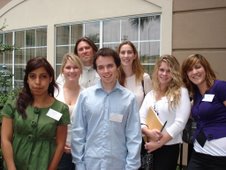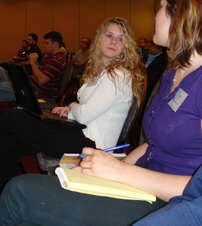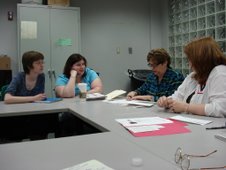Attending the Human Tales of Immigration Enforcement break-out session was a great way to start off my National Writers’ Workshop experience. Dianne Solís, senior writer for the Dallas Morning News, and Juan Castillo, writer for the Austin American-Statesman, led our discussion over immigration reporting.
“Immigration is the beat that just keeps on giving, from commerce to culture, tax policy and terrorism,” said Solís. “It’s full of tension, which is essential to good story telling.”
Solís shared some of her reporting experiences, beginning with the immigration enforcement issue in Farmers Branch, a suburb outside of Dallas. Farmers Branch proposed an ordinance barring illegal immigrants from renting apartments. Solís gave us closer look at an accidental activist and former Marine, Salvador Parada. He was former illegal immigrant given amnesty in 1986. Parada campaigned the proposed ordinance be put to a public vote.
Solís also discussed the immigration raid of the Swift & Co. meatpacking plants, one being in Cactus, TX. These raids involved Swift & Co. plants in six states and led to the arrests of almost 1,300 illegal immigrant workers. She said that the raids uncovered stories of compelling human drama, such as families being separated.
“Many families are mixed status families,” said Solís. “An estimated 3 million children have parents that are illegal immigrants.”
The meatpacking industry investigations shed light on our broken immigration system and exposed the issue of identity fraud of U.S. citizens by illegal immigrants.
The second speaker, Juan Castillo, shared his frustration over the impasse in fixing a 20-year immigration problem. He focused on the Hutto Detention Center for detained illegal immigrants. Castillo discussed his challenges obtaining information and reporting over its controversial accommodations.
“The human consequences of this impasse and how states and cities are trying to deal with the impasse is unconstitutional,” said Castillo. “The core of the problem is that mothers, fathers, and babies are in jail, although they call it a detention center, it is a jail.”
Castillo emphasized that these detainees are not criminals, but are housed at Hutto Detention Center which used to be minimum security prison. Many of the immigrants at the Hutto Detention Center are waiting on asylum. Presently, there is a congressional subcommittee investigating the conditions in the detention centers.
“Our objective is to shed some light on things that are happening in the shadows, such as Hutto Detention Center,” said Castillo. “It’s a human story, no matter how you think.”
Sunday, May 20, 2007
Subscribe to:
Post Comments (Atom)
















No comments:
Post a Comment